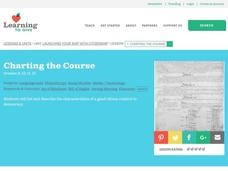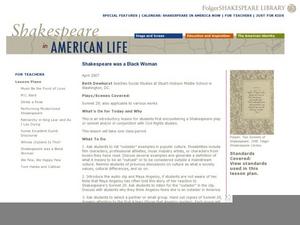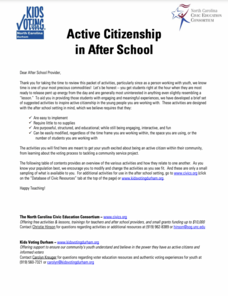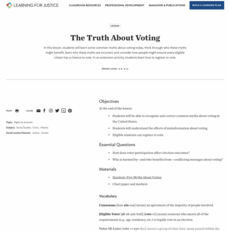Curated OER
Charting the Course
Learners explore the concept of philanthropy. In this citizenship lesson, students collaborate to compile a list of the top ten traits of good citizens. Learners then discuss random acts of kindness and create a plan to share kindness...
Curated OER
A Monument to Value
Students build a monument to represent trustworthiness. In this trustworthiness lesson plan, students discuss traits related to trustworthiness, suggest images that represent trustworthiness, and build a monument with those images.
Curated OER
The Staffing Exercise: A Lesson Cluster for Civics
Students discuss gender bias and non-traditional career areas as they relate to governmental appointed positions. The participate in a simulation in which they apply for and decide who would get traditionally male positions in the Dept....
Curated OER
Create Your Own Utopia
Learners identify and examine the history of Utopian societies of the 19th century. They analyze the novel "The Giver" to determine whether this is a fair society or not. Students also examine the differences between Jonas' society and...
Carolina K-12
Making First Vote Your Vote: Designing a Schoolwide Election
Encourage pupils to design an election plan for the entire school. They participate in a Board of Elections, create polling rules, discuss election controversies, write questions about the issues, run the election through an online...
Curated OER
Shakespeare Was A Black Woman
"I all alone beweep my outcast state." After a discussion of the "Shakespeare in American Life" segment in which Maya Angelou's relates her reaction to Sonnet 29, class groups create and perform a scene about an outcast that includes the...
US Institute of Peace
Perspectives on Peace
Is peace simply the absence of war, or is there more to the story? Young social scientists define peace in the second installment of a 15-part series. Groups work together to explore cultural concepts of peace and the peacemaking process...
US Institute of Peace
Organizations Working for Peace
From helping refugees to negotiating peace treaties, the peacekeepers of the world keep busy! Introduce young activists to the many individuals and organizations throughout the world that work daily toward peace. 14th in a series of 15...
Curated OER
Giving Beyond Measure-The Diary of Anne Frank
Middle schoolers read and analyze the play "The Diary of Anne Frank" based on the book of the same name. They identify philanthropic concepts and values in the play and discuss the ways in which specific characters actions affect the...
Curated OER
Just-Us and Kindness: On Our Terms
Middle schoolers consider their citizenship responsibilities in the world. In this philanthropy lesson, students define civic virtues as they consider how to be fair, just, and tolerant to promote human rights. Middle schoolers complete...
Curated OER
Presidential Places
Young scholars investigate American presidential landmarks throughout the continental United States. They research and analyze American presidential landmarks to determine their value to American history and how they have been preserved...
Facing History and Ourselves
Emmett Till: Choosing to Remember
Mamie Till, the mother of Emmett Till and civil rights activist, believed that her son's murder was the last straw before public outrage over racial injustice spilled over into the Civil Rights Movement of the 20th century. A history...
Curated OER
What is Meant by Returning to Fundamental Principles?
Students explain in what ways the American experience in self-government can be called an adventure in ideas. They evaluate positions on a number of issues related to the fundamental principles and values of government and individual...
Curated OER
Civil Liberties and War Powers: Korematsu v. United States
Eleventh graders compare and contrast Supreme Court decisions dealing with the application of civil rights during times of war, with emphasis on discrimination and detention. Working in groups, 11th graders review cases and analyze how...
Curated OER
Should Homosexuals Have the Right to Laws Protecting Them From Discrimination?
Students explore discrimination issues in America. In this homosexual rights lesson plan, students listen to their instructor lecture on antidiscrimination laws and gay rights. Students respond to questions about the Romer v. Evans case.
Curated OER
The Ugly Duckling: A Discussion of Human Rights
Pupils, after listening to The Ugly Duckling, by Hans Christian Anderson, become more aware of their relationship to human rights in regards to equality, justice, fairness, civil rights, and social justice.
Curated OER
Cultural and Social Transformation since 1865
Young scholars research the evolution of cultural and social issues in areas of Westward Expansion, Immigration, and Civil Rights. They practice writing clear details with supporting evidence and examples and evaluate ways of improving...
Curated OER
Introducing Recycling
Students study environmental issues of excess garbage and learn about recycling. In this recycling lesson, students discuss recycling and read a story about too much garbage. Students write a persuasive essay about the importance of...
Carolina K-12
Active Citizenship in After School
Active citizenship is the bedrock of any great democracy. Continue the trend by teaching the next generation about voting rights and the functions of elections in society. The variety of activities in the resource includes a human...
Teaching Tolerance
Why Local Elections Matter
Uncle Sam wants everyone to vote in local elections! Geared toward middle and high school scholars, the resource explores voter turnout and the importance of local elections. Academics participate in group discussion, complete...
Teaching Tolerance
The Truth About Voting
True or False: Only Presidential elections matter. Academics delve into common voting myths to understand what is true and why the election process is critical to democracy. The activity uses group discussion, activities, and handouts to...
Teaching Tolerance
The True History of Voting Rights
Explore what voting rights really are in an intriguing lesson plan that explores the history of American voting. The resource examines the timeline of voting rights in the United States with group discussions, hands-on-activities, and...
iCivics
Voting in Congress
In a role-play activity acting as members of either the Senate or House of Representatives, class members will vote on bills to halt mail delivery on Saturdays in the United States and to raise the minimum wage. Through an included...
DocsTeach
Analyzing a Letter About American Indian Voting Rights
An informative activity focuses on the law preventing Native Americans from voting until 1947. Scholars read documents from the Office of Indian Affairs, complete an online worksheet, and participate in group discussion. Academics learn...

























